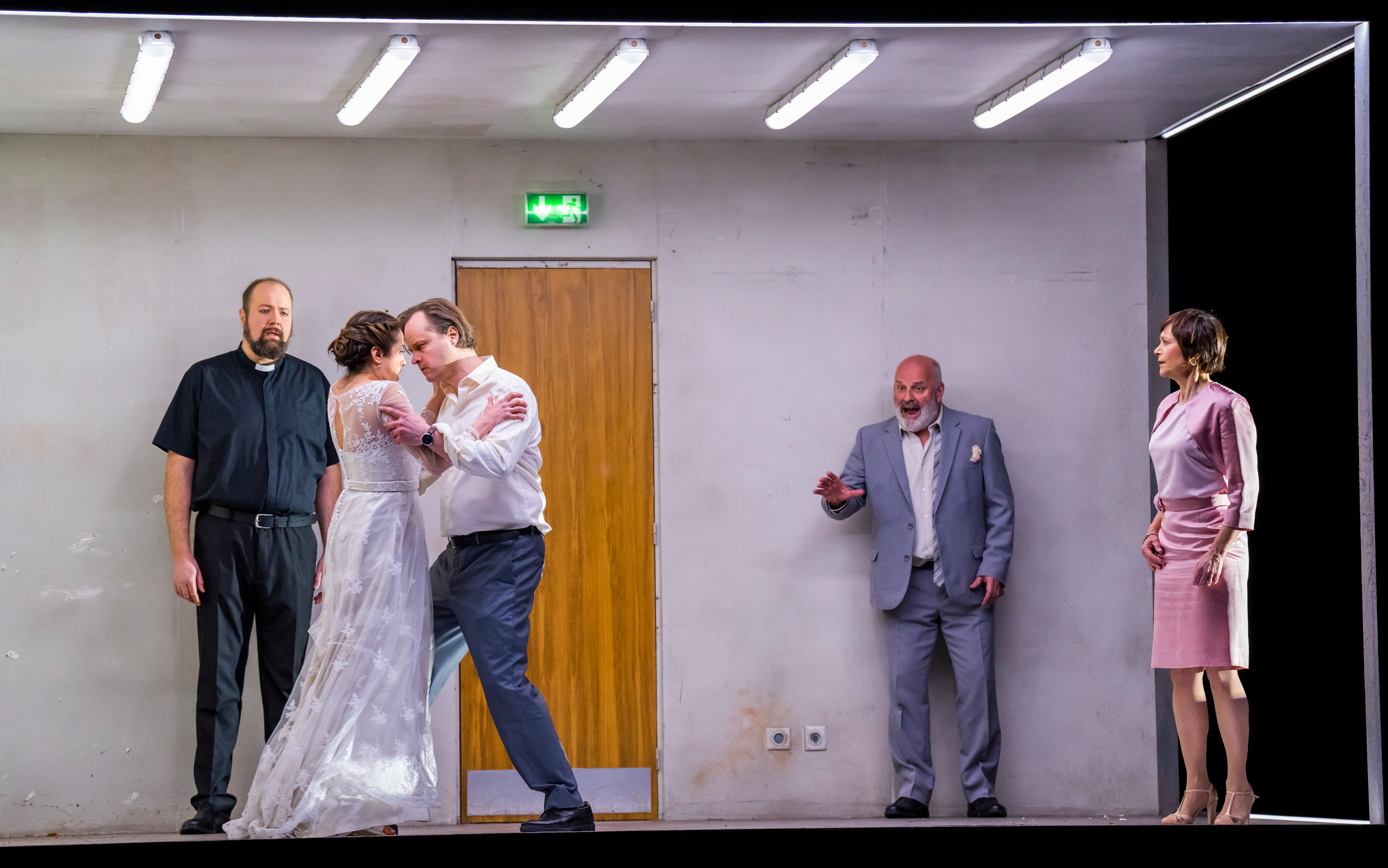Innocence review: Saariaho’s school shooting opera makes a powerful statement
This anticipated production, directed by Simon Stone, is painfully topical

It’s a long time since a London opera production got the frenzied advance attention Innocence has received, and that attention is for two quite separate reasons. First, because its 70-year-old Finnish composer Kaija Saariaho has been hailed by new-music enthusiasts as one of the greats: in a readers’ poll of composers last year for BBC Music Magazine, she was ranked at No 17, between Brahms and Haydn – remarkable for a composer of whom most people in Britain have not heard.
But the greater reason lies in the opera’s subject matter, which couldn’t be more painfully topical: a mass shooting at a school. Susanna Malkki, who conducted its premiere in Aix-en-Provence two years ago, and who conducts it now in London, regards it as one of the most important works of our time. Simon Rattle, who was at the premiere, said it was like watching Berg’s Wozzeck being born. And its birth was attended by representatives of opera houses in Amsterdam, Helsinki and San Francisco, as well as in London, all of whom were co-producers.
For Saariaho, for her librettist Sofi Oksanen and for her de facto second librettist (and son) Aleksi Barriere, the evolution of the work was a tortuous process that only resolved itself with a decision to parallel the real world with a retrospective “memory” world peopled by the dead.
The action focuses on the wedding in present-day Helsinki of Tuomas and his Romanian bride Stela, who knows nothing about what is initially described as a shadowy family “tragedy”. But some guests at the wedding are haunted by their memory of being part of that tragedy, and a waitress named Tereza realises that this was the family whose son caused her daughter Marketa’s death in that event. She confronts Tuomas’s father and mother who are shown to be hopelessly conflicted as whether their elder son – the shooter – can ever be redeemed.
Tereza blurts out the truth to the assembled guests, whereupon the opera turns into a passionate debate about responsibility. Was the shooter a monster? It turns out he had been bullied. It also emerges that the crime had originally been planned by both brothers, with Tuomas chickening out, and their brotherly love still persists. Should society take the blame? Can this trauma in the collective psyche ever be exorcised?
Running this two-hour work straight through without an interval, Simon Stone’s production gives us just one glimpse of the nameless assassin, and there’s no violence on stage. What there is, is Chloe Lamford’s set: a rectilinear Bauhaus school building like a giant Rubik’s cube containing several smaller cubes, the whole thing gently rotating to allow scene changes. Real life takes place on the brightly lit ground floor, with the world of memory being on the floor above in sub-fusc gloom.
The opening scene has a chorus of ex-students too paralysed by retrospective shock to get on with living, after which the plot, with its horrifying revelations, gets underway. Aspects of the atrocity are convincingly re-enacted, while the increasingly anguished debate between the parents of the killer (Christopher Purves and Sandrine Piau) is sharpened by the rage of truth-telling Tereza (superbly sung by Jenny Carlstedt) and by the ghost of her daughter Marketa (incarnated with winning sweetness by Vilma Jaa).
Lilian Farahani and Markus Nykanen sing valiantly as the bridal pair, but the scoring of their parts doesn’t allow their voices to ever fly free. And therein lies one of the limitations of this work: Saariaho treats human voices as though they are additional orchestral instruments, and doesn’t seem interested in vocal lines or choral effects. Her orchestrations, however, have great suggestive power. One could argue, in fact, that the whole work is less an opera than a sound installation and, with a staging this brilliant, there’s no shame in that.
The other limitations lie in the fact that the work is sung in six languages (à quoi bon?), and in the plot’s conclusion: it’s as though the librettists couldn’t agree on how to wrap things up, and as a result the work peters out aimlessly.
But what we come away with far outweighs any defects Innocence may have. It makes a massive statement about communal responsibility for the crimes of disturbed young people. But the audiences in need of this lesson are all in Republican parts of America. When is the show going to open in Texas?
‘Innocence’ runs at the Royal Opera House, Covent Garden, until 4 May



Join our commenting forum
Join thought-provoking conversations, follow other Independent readers and see their replies
Comments